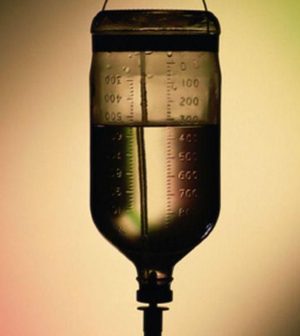- Could Artificial Sweeteners Be Aging the Brain Faster?
- Techniques for Soothing Your Nervous System
- Does the Water in Your House Smell Funny? Here’s Why
- Can a Daily Dose of Apple Cider Vinegar Actually Aid Weight Loss?
- 6 Health Beverages That Can Actually Spike Your Blood Sugar
- Treatment Options for Social Anxiety Disorder
- Understanding the Connection Between Anxiety and Depression
- How Daily Prunes Can Influence Cholesterol and Inflammation
- When to Take B12 for Better Absorption and Energy
- Epsom Salts: Health Benefits and Uses
IV Anemia Meds Can Sometimes Trigger Severe Allergy

The chances of a severe allergic reaction being triggered by intravenous (IV) iron formulations for anemia are higher with some than others, but all pose a low risk, a new study says.
Researchers compared five IV formulations commonly used to treat iron deficiencies among older patients who can’t swallow or tolerate iron pills.
They analyzed the medical records of about 167,000 older Medicare patients who received IV iron formulations between 2013 and 2018. The formulations included iron dextran, ferumoxytol, ferric gluconate, iron sucrose and ferric carboxymaltose.
All five carried a very low risk of a life-threatening allergic reaction (anaphylaxis), but the highest rates were for iron dextran (10 patients per 10,000) and ferumoxytol (4 patients per 10,000).
“Quantifying the risk of anaphylaxis from current intravenous iron formulations is important because so much is unknown,” said study lead author Chintan Dave, an assistant professor in the Center for Pharmacoepidemiology and Treatment Science at Rutgers University in New Brunswick, N.J.
‘That led us to compare the risk specifically between five most frequently used products. Our investigation offers an important step forward in understanding this problem,” he said in a university news release.
‘We conclude by saying that the rates of anaphylaxis were very low with all IV iron products, but three- to eightfold greater for iron dextran and ferumoxytol compared with iron sucrose,” said Dave, who is also a professor at the Ernest Mario School of Pharmacy at Rutgers.
The study was published in the journal Annals of Internal Medicine.
The researchers noted that allergic reactions occur more often in older patients, but it’s not clear why IV iron-boosting formulations sometimes unexpectedly cause a severe allergic reaction.
Not only that, but “anaphylaxis is just one of many factors to consider when deciding on which IV iron formulation to administer,” Dave explained. “These include not only the risk of anaphylaxis but also other factors such as the clinical indication, number of IV iron administrations required, risk of other adverse reactions and cost.”
The researchers said there was positive news regarding one often-used product.
The findings “provide reassuring data with respect to the risk of anaphylaxis with ferric carboxymaltose, which has seen a rapid increase in use following favorable clinical trial data in a variety of clinical indications,” said study co-lead author Dr. Soko Setoguchi, a professor of medicine and epidemiology at Rutgers Medical School and School of Public Health.
“By clarifying the risk of this rare, but severe adverse reaction, this information can be used to contribute to the choice of IV iron preparations,” she said in the release.
More information
There’s more on anemia at HealthinAging.org.
SOURCE: Rutgers University, news release, March 28, 2022
Source: HealthDay
Copyright © 2026 HealthDay. All rights reserved.










